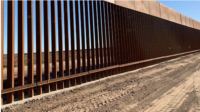Trump Administration Seeks Border Wall Builders as GAO Warns About Costs

Border wall prototypes have constructibility cost uncertainties in some locations, says GAO..
PHOTO: AP IMAGES
The Trump Administration seeks more contractors to upgrade existing Mexico border barriers even as a federal court decides if it's still legal for the government to waive U.S. environmental laws to speed construction and as a government watchdog report says the U.S. Dept. of Homeland Security did not fully consider costs for a possible larger border wall in all needed locations in its prototypes.
A public version of the U.S. Government Accountability Office report on border wall designs and locations released Aug. 6 found that DHS priorities included data on illegal entry into the U.S. but no analysis of constructibility factors such as hydrology, slope and geophysics.
The agency averaged cost per mile rather than determining cost for each construction project, GAO says. DHS estimated a price of $18 billion for 722 miles of barrier, but, without other cost parameters, the wall could “cost more than projected, take longer than planned, or not fully perform as expected,” says the report, which calls for such analysis in future planning.
In March 2017, DHS sought bids for prototype wall designs using reinforced concrete and allowing other materials. Six firms built eight prototypes from which the agency identified criteria to customize barriers in specific locations.
An analysis by DHS and the U.S. Army Corps of Engineers showed that the four concrete designs would pose extensive construction challenges, especially on sloping terrain.
Two designs from other materials would pose substantial challenges and two would be moderate. Six prototypes would need substantial or extensive design changes to meet required surface drainage and six required substantial or extensive changes for border patrol access gates, said the analysis.
Test result details, deemed sensitive, were omitted from the GAO report.
The administration ignored set acquisition protocols, Mississippi Rep. Bennie Thompson, senior House Homeland Security Committee Democrat, said in a statement. “Spending billions on the President’s wall is just a gift to contractors,” he said.
Chairman Michael McCaul (R-Texas) did not comment, nor did the White House, but DHS agreed with some GAO conclusions in report comments.
A California Coastal Commission spokesman told ENR that plaintiffs, which include several state agencies and environmenta groups, want a ruling on their claim that a 2005 law permitting waivers of key federal environmental reviews is expired.
Judges of the federal appeals court in San Francisco on Aug. 7 heard arguments in the appeal of U.S. District Court Judge Gonzalo Curiel’s decision to allow a prototype wall to replace 15 miles of fence in California without the reviews. Ex-DHS Secretary John Kelly already waived laws to build the prototypes in San Diego.
Meanwhile, the House of Representatives included $5 billion for the wall in a pending fiscal 2019 federal budget bill. The Senate proposes $1.6 billion, but only for existing barriers.
President Donald Trump, who seeks $25 billion in wall funding, has threatened a government shutdown. Congress has until Sept. 30 to finalize a budget.
In its request for qualifications to contractors issued July 12, the Corps seeks firms to build border barriers in California, Arizona and Texas.




